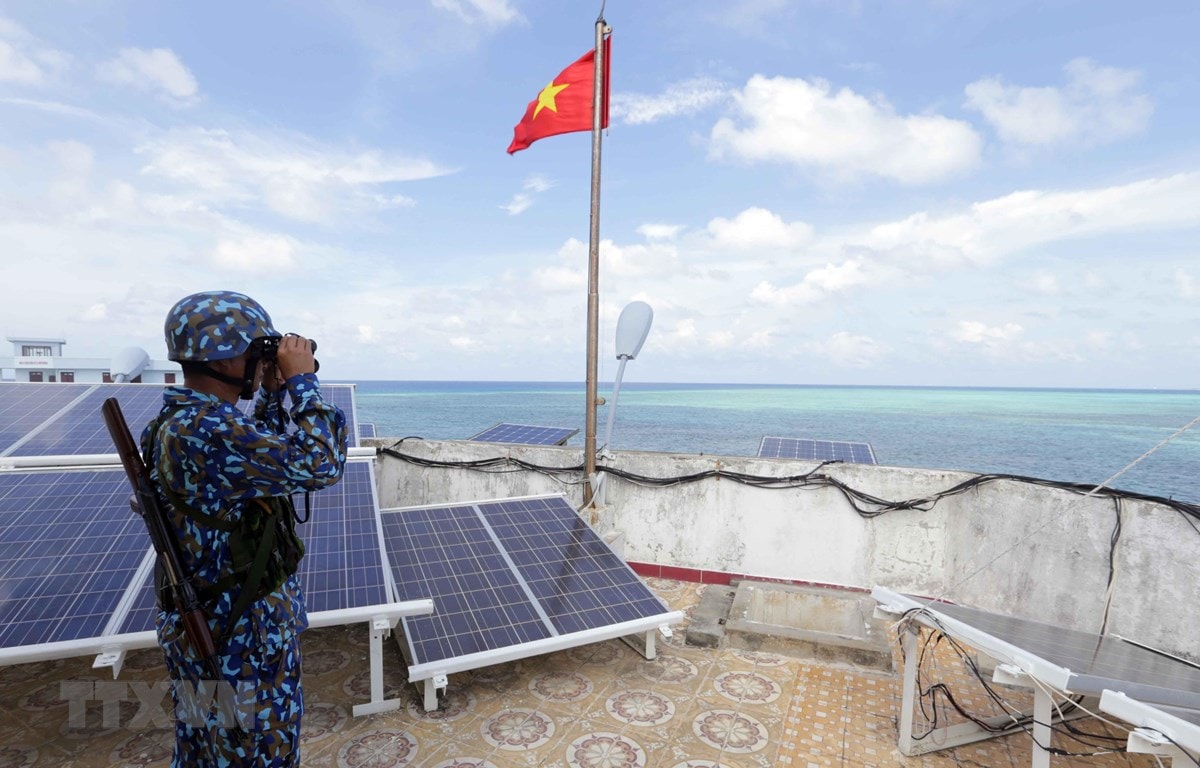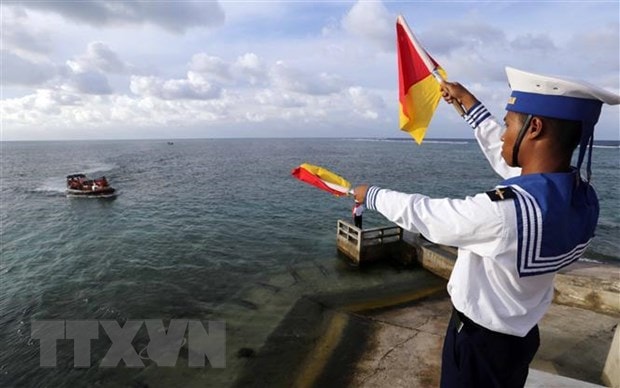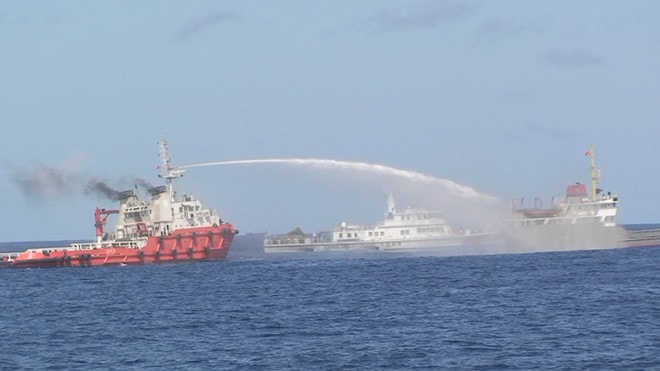Respect for international law for living space and development in the East Sea
Mr. Nguyen Manh Dong - Director of the Sea Department under the National Border Committee (Ministry of Foreign Affairs), answered an interview with Vietnam News Agency about the East Sea issue.
 |
| Soldiers on Co Lin Island, Truong Sa Island District, day and night raise their vigilance, guarding the sea and sky of the Fatherland. Photo: Tran Viet/VNA |
In an interview with Vietnam News Agency, Mr. Nguyen Manh Dong - Director of the Sea Department under the National Border Committee (Ministry of Foreign Affairs) emphasized that countries, regardless of their level of development, scale and influence, need to make joint efforts, in the spirit of goodwill, construction, and respect for the law, through practical and specific actions, to maintain a favorable environment to promote this common trend for the benefit of the countries themselves as well as the international community in the context of deep international integration and increasing interdependence.
FOR THE COMMUNITY INTEREST OF COUNTRIES AND THE INTERNATIONAL COMMUNITY
- Sir, can you assess the importance of maintaining a peaceful, secure, stable environment and promoting friendly cooperation in the East Sea region?
Mr. Nguyen Manh Dong:First of all, we can affirm that peace, security, stability and cooperation for development are the aspirations of all peoples in the world and the common development trend of mankind, taking place at all times, everywhere, across regions and continents.
Countries, regardless of their level of development, size and influence, need to make joint efforts, in the spirit of goodwill, constructiveness, and respect for the rule of law, through practical and concrete actions, to maintain a favorable environment to promote this common trend for the benefit of the countries themselves as well as the international community in the context of extensive international integration and increasing interdependence.
MondayReality clearly shows that peace, stability, security and cooperation are some of the important foundations for the dynamic and multifaceted development of the Asia-Pacific region in general and the East Sea region in particular in recent decades.
Thursdaya, The East Sea is a living and developing space for coastal countries, including Vietnam; a space for development cooperation between countries in the region and partners inside and outside the region and is home to important air routes and also home to vital sea routes of the world in terms of both the value of goods transported as well as the number of ships passing through, many large economies in and outside the region such as China, Japan, South Korea, Australia, the European Union... depend heavily on the sea routes through the East Sea.
Based on the importance and strategic position of the East Sea for countries in and outside the region, respecting the sovereignty, sovereign rights, jurisdiction of coastal states, and freedom of navigation and aviation established in accordance with the provisions of the United Nations on the Law of the Sea 1982 (UNCLOS) is the basis for ensuring peace, stability, security and cooperation in the East Sea region.
For that reason, in recent years, countries bordering the East Sea, countries inside and outside the region have been extremely concerned about unilateral actions that infringe upon the legitimate maritime rights and interests of coastal countries, such as obstructing legitimate activities at sea, exploration, surveying, violating the sovereignty and jurisdiction of coastal countries, and promoting reclamation, filling, and militarization of illegally built structures...
These actions have led to the erosion of trust, increased tensions and may have negative impacts on peace, security, stability, cooperation and development in the region and globally.
The international and regional communities have repeatedly expressed concern and indignation at the above-mentioned unilateral violations, calling for respect for the rule of law and conduct in accordance with relevant provisions of international law and UNCLOS for the common interests of countries and the international community.
UNCLOS, THE SHAPE OF AN INTERNATIONAL LEGAL ORDER
- How is the role and significance of UNCLOS emphasized in resolving disputes between countries at sea, sir?
Mr. Nguyen Manh Dong:This year, UNCLOS member states celebrate the 25th anniversary of the Convention's entry into force.
Speaking on this occasion at the Conference of States Parties to UNCLOS held at the United Nations Headquarters, the UN Secretary-General re-emphasized the significance of UNCLOS as the “Constitution of the seas and oceans,” a comprehensive framework for the peaceful, cooperative and sustainable exploitation and use of the seas.
 |
| Instructions for boats entering Da Dong Island, Truong Sa, Khanh Hoa. Photo: Tran Viet/VNA |
Here, I would like to emphasize the following points: The birth of UNCLOS is an important step in forming an international legal order that regulates all activities related to seas and oceans.
In other words, UNCLOS is both the most important and comprehensive legal basis for countries to determine and exercise their rights and obligations in maritime zones, and at the same time, the basis for countries to resolve disputes related to the interpretation and application of the Convention in practice.
To date, the vast majority of United Nations member states (168/192) are parties to the Convention and, accordingly, are obliged to comply with and implement the relevant provisions of UNCLOS in a responsible and good faith manner.
Disputes relating to the interpretation and application of UNCLOS are an objective reality in the process of implementing and applying the Convention.
However, States have the responsibility to resolve relevant disputes peacefully by means as provided for in Article 33 of the United Nations Charter and Article 279 of UNCLOS. Here, it is also necessary to distinguish between real disputes and unilateral violations, and UNCLOS is the basis for determining which is a dispute and which is a violation.
 |
| Chinese ships used water cannons with high pressure, damaging equipment and breaking the glass windows of Vietnamese fisheries surveillance ships in 2014. Photo: Zing.vn |
One of the most fundamental and progressive features of the dispute settlement provisions in UNCLOS is the provision on compulsory dispute settlement procedures leading to binding decisions.
This means that, under certain conditions and circumstances, disputes concerning the interpretation and application of UNCLOS can be resolved by a third party and the decision of the third party is binding on the parties concerned.
Over the years, a number of countries in the region and outside the region have used this procedure to successfully resolve their specific disputes regarding the interpretation and application of relevant provisions of UNCLOS.
In short, UNCLOS is the international legal foundation for resolving disputes related to the application and interpretation of the Convention, the basis for countries to protect their legitimate rights and interests, and properly resolve related disputes, thereby contributing to further promoting relations between countries.
International and regional documents affirm the important role of UNCLOS in resolving international disputes related to the sea.
DETERMINED TO PROTECT VIETNAM'S SEAS
- How has Vietnam applied peaceful measures, according to international law, in the struggle to protect Vietnam's sovereignty over seas and islands, and its legitimate rights and interests, sir?
Mr. Nguyen Manh Dong:Vietnam's consistent policy is that all international disputes, including those in the East Sea, must be resolved by peaceful means, as stipulated in the United Nations Charter, UNCLOS.
This has been clearly affirmed in the Resolution of the National Assembly ratifying UNCLOS on June 23, 1994 as well as in the 2012 Law of the Sea of Vietnam as well as many other relevant legal documents and normative documents.
On that basis, up to now we have completely resolved the issue of delimitation of the Gulf of Tonkin and fisheries cooperation in the Gulf of Tonkin with China (in 2000), delimitation of the sea with Thailand (in 1997), delimitation of the continental shelf with Indonesia (in 2003), signed the Agreement on joint oil and gas exploitation with Malaysia (in 1992) and the Agreement on historical waters with Cambodia (in 1988).
These are extremely important achievements, creating an international legal basis, forming a “fence” for us in the relevant sea areas. At the same time, we are continuing to promote negotiations to resolve the issue of delimiting the sea area outside the Gulf of Tonkin with China; delimiting the exclusive economic zone with Indonesia…
We always respect the sea areas of neighboring countries as determined in accordance with UNCLOS, and have measures to propagate and educate our fishermen and those operating at sea to comply with international law, UNCLOS, and not to violate foreign waters. However, we are also determined to protect Vietnam's sea areas.
Regarding violations of our exclusive economic zone and continental shelf determined in accordance with relevant provisions of UNCLOS, we persistently and resolutely fight with peaceful measures such as diplomatic communication to point out violations under relevant provisions of UNCLOS, sending notes of protest, circulating notes at the United Nations; at the same time, we also affirm that Vietnam reserves the right to use peaceful measures in accordance with international law to protect its legitimate and legal rights and interests under UNCLOS.
RESPECT AND ENFORCE THE PROVISIONS OF UNCLOS
- Can you tell us about Vietnam's efforts in implementing and promoting UNCLOS and international cooperation on the sea?
Mr. Nguyen Manh Dong:Vietnam was one of 107 countries that signed UNCLOS in Montego Bay, Jamaica, immediately after the document was opened for signature and was one of the early ratifying countries, before the Convention came into effect in 1994.
Along with that, Vietnam has also joined the Agreements implementing this Convention, including the 1994 Agreement on the Implementation of Part XI of the Convention and the 1995 Agreement on Amphibian and Highly Migratory Fish Stocks.
Over the years, Vietnam has always respected and fully implemented its obligations under the Convention by internalizing the provisions of the Convention and constantly improving the national legal system on the sea; using the provisions of the Convention as a basis for resolving delimitation issues and promoting maritime cooperation with neighboring countries sharing the sea.
In 2009, Vietnam submitted a National Submission on the Determination of the Limits of the Continental Shelf Beyond 200 Nautical Miles and a Vietnam-Malaysia Joint Submission on the Limits of the Continental Shelf Beyond 200 Nautical Miles in the Southern part of the East Sea.
In terms of bilateral relations, we have early implemented marine scientific research cooperation with the Philippines since 1996, 2000, 2005 and 2007 and based on this success, Vietnam and the Philippines have agreed to institutionalize the maritime cooperation mechanism between the two countries, expanding cooperation from marine scientific research to new fields such as marine environmental protection, search and rescue, oil spill response, etc.
With China, within the framework of cooperation in less sensitive areas at sea, Vietnam and China have successfully implemented the project of Comparative Research on Holocene sediments in the Red River Delta and the Yangtze River Delta; and implemented cooperation in releasing fish and protecting aquatic resources in the Gulf of Tonkin.
Currently, we are promoting cooperation in the fields of search and rescue, maritime affairs, and establishing a hotline to handle unexpected incidents arising from fishing activities at sea, and cooperating in implementing a number of new projects on environmental protection in the Gulf of Tonkin.
In addition, we also established a joint maritime patrol mechanism with Thailand (in 1998), Cambodia (in 2002); and China (in 2005) to maintain order in relevant sea areas, creating conditions for further strengthening cooperation between relevant forces of the two countries, thereby contributing to promoting friendly neighborly relations.
Within the framework of ASEAN, we also proactively and actively participate in initiatives and cooperation areas in the East Sea such as ASEAN Senior Transport Officials (STOM); ASEAN Search and Rescue Forum (ATSF); ASEAN Maritime Forum (AMF); Maritime Transport Working Group (MTWG); ASEAN Working Group on Marine Science and Technology (SCMSAT); ASEAN Fisheries Working Group (ASWGF), Regional Cooperation Programme on Marine Environmental Management in East Asia (SEAFDEC)...
At the same time, within the framework of implementing the Declaration on the Conduct of Parties in the East Sea between ASEAN and China (DOC) and negotiating the Code of Conduct (COC), we have had many initiatives and proactively contributed to the common interests of the parties as well as ASEAN-China maritime cooperation.
Vietnam also actively participates in activities within the framework of international mechanisms established under the Convention.
Vietnam fully participates and makes active contributions to the Conference of States Parties to the Convention held annually at the United Nations General Assembly, conferences of the Seabed Authority; supports the strengthening of the activities of the Commission on the Limits of the Outer Shelf and enhances the role of the International Tribunal for the Law of the Sea; participates in the development of international legal documents on the conservation and use of marine biodiversity in international waters...
In addition, Vietnam has also participated in building many international and regional legal mechanisms and documents related to the sea such as the International Convention on Maritime Satellite Organization (INMARSAT), Global Maritime Distress and Safety System (GMDSS), joining the International Maritime Organization (IMO) Convention and other IMO conventions....
These are vivid evidences demonstrating the goodwill, positivity, determination and practical commitment of the Vietnamese Government to respect and enforce the provisions of UNCLOS, and at the same time demonstrating Vietnam's efforts and consistent policy in cooperating to resolve disputes and disagreements at sea by peaceful means, in accordance with international law, including UNCLOS, to promote cooperation with countries and protect Vietnam's legitimate rights and interests in the East Sea.
Thank you very much!

